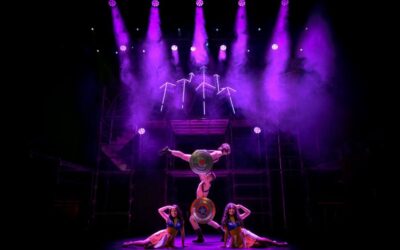Set to be one of the most talked about performances of 2024, Gaslight, a modern adaptation of the 1930’s suspenseful thriller by Patrick Hamilton and starring Geraldine Hakewill, Toby Schmitz and Kate Fitzpatrick has opened in Melbourne as part of a national tour throughout 2024.
Gaslight has been adapted by respected Canadian writer / performers Patty Jamieson and Johnna Wright and world premiered at the internationally renowned Shaw Festival in Canada in 2022.
A mammoth and geographically challenging task indeed for the two writers who spent four or five years working on the project, alongside other projects they each had going.
The pair were eager to work together because they both felt the need to do something creative while raising their then elementary-school sons. “Johnna had always wanted to do something with Patrick Hamilton’s Gaslight, to update it somehow, but didn’t know exactly how,” says Jamieson. “So, we started to talk about what might connect that story to a modern audience.”
“It was mostly “long-distance” as we live in opposite ends of the country, so we would meet over Skype or Zoom and kind of give ourselves assignments for what to write (or rewrite) next,” says Wright. “Obviously, the living in different cities was somewhat of a challenge, and from time to time, one or the other of us would get very busy with other theatre work (Wright as a director, and Jamieson as an actor) so for a period of a few months we would have to press pause. Although it didn’t speed up the process, it was a good thing in a way, as it allowed time for things to percolate.”
The pair would then meet weekly to decide together what might happen next in the story, then one of them would write a scene, and the other would make notes and revisions on it. “So, in the end we have both had our spoons in the soup on every page,” says Wright.
“We also talked a lot about what kind of story we wanted it to be. For example, we could say to each other, if Bella does this, what will that mean for the story and the scene? It was always good to have discussion and someone else’s opinion about that sort of thing. It makes the writing process less lonely!
I think the most fun was when we decided to eliminate the Inspector. Because we were left with, “What now?” We had no idea what would happen next, so we imagined ourselves in Bella’s position and tried out all kinds of possibilities. Ironically, this was also one of the hardest parts of the writing process, because we were going “offroad” as it were and had to constantly make decisions about what to include and what to change from the original play.”
Both creatives had seen the film along the way, but they have based their adaptation solely on the play that Patrick Hamilton wrote, entitled Angel Street.
” I suppose as women of the era we live in, we found the passivity of the protagonist, Bella, an interesting challenge,” says Wright. “It just didn’t ring true to us all the time, and while we weren’t interested in making her a “superhero” we really wondered how she would manage if she had to figure out the mystery in her own home for herself. Without revisionist history, keeping largely to the rules of society at the time of the original, could we make this adaptation something that would resonate with modern audiences?”
As part of their work, Jamieson and Wright studied the play quite a bit, because they wanted to preserve most of the original characters and the setting, then imagine things going off in a different direction because there was no rescuer. They have also seen both film versions but didn’t use them as a reference. The movies, they say, especially the American version with Ingrid Bergman, change the plot quite a bit.
So, fans of the original play or film should expect to find the setting, the characters (most of them), and the mystery itself in this version. “It’s still a thriller, with a woman in a gloomy Victorian mansion where a murder once took place, mysterious noises at night, and of course the gaslight going down for no apparent reason,” says Jamieson. “What is different is that instead of being rescued by a police inspector, the woman has to rescue herself.”
Both playwrights admit to liking a story where you see people be transformed – maybe by external events and maybe by their own efforts. “We like stories that are interesting and sometimes situationally a little bit funny, but if there is no transformation, then it doesn’t seem entirely worth the effort, either to us or to an audience,” says Wright.
Jamieson and Wright hope that Gaslight will provoke conversation about how women and men may or may not have changed since 1938. The posit: Can you look at this story in a contemporary light? “It’s fun to discuss a play, especially a thriller, in terms of what you thought was happening from scene to scene, and once you know the ending, to retrace the paths of the various characters,” says Jamieson. “Did you know whose side Elizabeth was on and when? What do you think happened to Nancy? I also hope people will discuss the notion of adapting a great story like Gaslight.”
As we learn more about the Manningham household, it becomes clear that something is amiss. Despite his doting appearance, Jack is hiding something – he keeps disappearing in the evenings …and after he leaves, Bella hears strange sounds in the house. The gas lights dim for no apparent reason. Is Bella losing her grip on reality? Or is something more sinister afoot?
Says Wright, “Director Lee Lewis and the creative team have brought an absolutely gorgeous production of Gaslight to Australian audiences. The sets and costumes, the lighting and the music are all first rate, and the cast and direction are absolutely fabulous. It is a splendid and satisfying evening in the theatre. Productions like this do not come along every day. Don’t miss it!”
On tour till September 15, 2024
For more details: https://gaslightplay.com.au/





